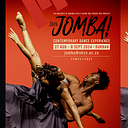JOMBA! DIGITAL EDGE A FEAST OF DELIGHTS FOR AUDIENCES
Guest Writer Marcia Mzindle shares her short form reviews for tonight’s programme
QUEERING THE LENS
Sabelo Cele’s Uhambo is a spiritual and thought-provoking performance. A performance that reads as the chaos and the entanglement that happens in life’s journey. A representation of how at times, we are out of sync mind, body and soul. Yet, also so magnificent when in alignment and we have found our soul/life purpose. The performance captures the eye not only choreographically but also visually through beautiful scenic views/locations.
IMPOSED BORDERS ON WOMEN’S BODIES
Sinethemba Khuzwayo’s BORDER IMPOSITIONS offers a story of two Black female bodies claiming their autonomy, freedom and their place in the world. Khuzwayo’s is a declaration that we will be loud and bold and we will continue to struggle against the confinements of imposed femininity. As I watch the work, I am also considering the rising femicide and gender-based violence cases in South Africa and the fear in which all women in the country live. Into this, the work becomes a visceral protest against patriarchy and the violent masculinities that govern our existence. These bodies know and have also been affected by the double jeopardy and prejudice of being Black and female.
INTERROGATING IDENTITY, REINCARNATING THE SPIRIT OF UBUNTU
Cameron S. Govender’s nine-minute and forty-nine-second Aikyam… reincarnating identity interrogates identity poking at the question “Who are you?”. Beginning with Govender seeking shelter, hiding under a table as the sounds of planes flying and bombs dropping overhead are heard, the initial pixelated view finds sharp focus in its questions. Are we bodies that bend and wilt, or is there more to this flesh and bones that is the stuff of us? What sets us apart and when we may share certain likenesses? Though the body may return to dust or ash, may our souls always find the light. Aikyam… reincarnating identity is captured through a combination of stillness, Bharatanatyam dance and dance movement with an integration of voiceover poetry which brings a powerful dynamic element to the production.
TRANSLATING THE UNTRANSLATABLE
An isiZulu proverb states, ‘IsiZulu asitolikwa’ in a direct translation into English: IsiZulu is not translated/translatable. Not because it cannot be translated, this comes with the understanding that some words lose their vigour when translated or the meaning does not fully equate the impact or capacity of its own context when translated. By this I find the trouble in translating ‘Imthwalo’ as it cannot be categorised as one thing. It is fluid depending on context. ImThwalo choreographed by Aphelele Nyawo can be translated to mean “baggage, load, responsibility, or burden”. The screen dance work, performed by Nyawo with Sphakeme Nduli, presents the challenges of the families affected by the socio-economic issues and burdened with the yoke of unemployment, poverty, and possible feelings of hopelessness or being stuck, now exacerbated in the times of Covid-19.
WRITING AND RE-WRITING SELF
Thobile Maphanga’s Sihamba Sizibhala, offers a reminder that we are composing symphonies that are our life stories, expanding our views through travel, remembrance, friendships we make, love and even loss. In recollecting and compiling our stories, we need to remember that we have a choice. To leave behind those that burden and trouble our souls. And choose to bask in the sun and the goodness of life. The performance explores how we are the masters of our fate — reflecting how we never fade as we continue to live on, like a collection of words on the pages of books. Leaving remnants through the things we say, touch, our smell, the deeds we do and impressions we give, giving a piece of ourselves, a mark that stays even when our time on this earth has passed.
IDLOZI IYAPHIYALA FUTHI LIKHONA
Can you see me now? choreographed by Cue Ngema expresses our connection with the world beyond, with Okhokho, nobab’mkhulu Ogogo no Mkhulu those who were before. Some known and others unknown to us who now guide and mediate for us while we are experiencing life on this physical plane. The performance reads as an intercession to be heard, to be seen, to be guided. A remembering that we are not alone, our ancestors are forever present, even in the midst of chaos. Kumele si phahle, sikhuleke nakuMvelinqangi, so we are open to hearing, receiving messages, and using the strengths and gifts given to us. To fully walk in our life’s purpose and the skills/gifts that we have been given to share in the waking life.
“JOMBA! Durban Digital Edge 2021” features seven commissioned works by Durban dance makers and will screen on Thursday 26th August at 19:00 (CAT) as part of the 23rd JOMBA! Contemporary Dance Experience.
The CCA’s JOMBA! 2021 runs from 24th August to 5th September and can be navigated free of charge via the website www.jomba.ukzn.ac.za or subscribe to the JOMBA! YouTube channel here: https://www.YouTube.com/Jomba_Dance
A full programme is available via the website.
